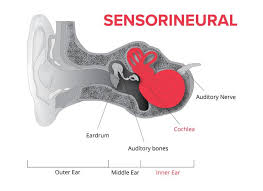Audiogram & Diagnosis
An audiogram maps the softest sounds you can hear across pitches (typically 250–8,000 Hz). In sensorineural loss, both air and bone conduction thresholds dip together, which helps your clinician confirm the type and degree of hearing loss.
- Measures thresholds across frequencies (250–8k Hz)
- Compares air vs bone conduction
- Classifies degree: mild, moderate, severe, profound
SNHL typically shows no significant air–bone gap. If a gap is present, it suggests a conductive or mixed component.
 SNHL Pattern
SNHL Pattern
Pure-Tone Testing
Headphones deliver tones; you respond to the faintest sounds heard.
Bone Conduction
A tiny vibrator behind the ear bypasses the middle ear to test the cochlea directly.
Interpretation
Your audiologist explains results and recommends the next steps at Elite Listen.